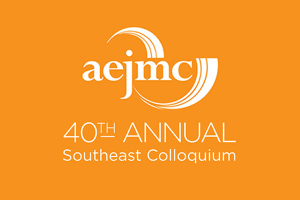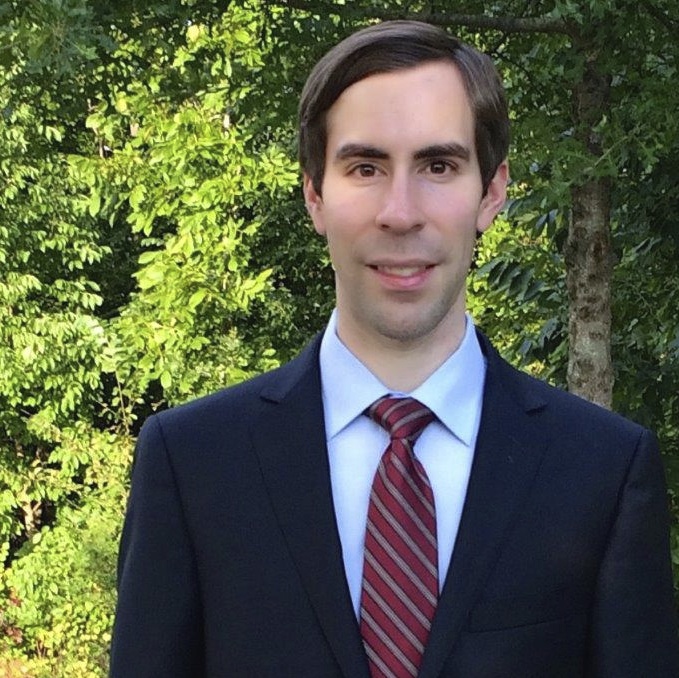 The UNC Center for Media Law and Policy’s new director of communications and six graduate students are presenting research papers in the Law and Policy Division at the Association for Education in Journalism and Mass Communication’s (AEJMC) Southeast Colloquium in Knoxville, Tenn., this week. Kevin Delaney, who is in the final year of UNC’s dual-degree program, earning a master’s in journalism and a law degree, won the prize for the top student paper.
The UNC Center for Media Law and Policy’s new director of communications and six graduate students are presenting research papers in the Law and Policy Division at the Association for Education in Journalism and Mass Communication’s (AEJMC) Southeast Colloquium in Knoxville, Tenn., this week. Kevin Delaney, who is in the final year of UNC’s dual-degree program, earning a master’s in journalism and a law degree, won the prize for the top student paper.
Congratulations!
The papers went through a process of blind review, with students and faculty competing in the same category. UNC papers represent almost 45 percent of the papers to be presented in the Law and Policy Division.
The media law center’s director of communications is Tori Ekstrand, an assistant professor in the UNC School of Journalism and Mass Communication. Most of the student papers were written for a media law class she taught last fall. Here is her paper title and abstract:
Victoria S. Ekstrand, “A First Amendment Right to Know for the Disabled: Internet Accessibility under the Americans With Disabilities Act (ADA) and the First Amendment”
The Americans with Disabilities Act (ADA) will celebrate its 25th anniversary in 2015. Enacted by Congress and signed into law by President George H.W. Bush, the ADA was designed to ensure that people with disabilities are given “independence, freedom of choice, control of their lives, the opportunity to blend fully and equally into the rich mosaic of the American mainstream.” Title III of the ADA defines what kinds of public and private spaces must provide access and accommodations to the disabled. Missing from that list, because of the ADA’s timing, is the Internet, effectively shutting the disabled out of the rich marketplace of ideas online. This paper examines both the case law surrounding this omission and the foot-dragging of the executive and legislative branches in extending Title III to the Internet. It argues that extending Title III to the Internet may be bolstered by First Amendment right-to-know principles.
Here is the title and abstract for Kevin’s prize-winning paper:
Kevin Delaney, “Balancing in Light of the Purposes of Copyright: Whether Video Music Lessons Should Constitute Copyright Infringement”
Faced with diminished sources of revenue, school systems in recent years have cut funding for music education. Looking for alternative ways to learn about music, budding musicians have turned to the Internet. On websites such as YouTube, visitors can view thousands of instructional videos on how to play popular songs, complex genres, and a seemingly unlimited variety of musical techniques. Despite altruistic motivations,
creators of “video music lessons” routinely use copyrighted content during the lessons. This paper argues that the defense of fair use should protect the creators of video music lessons from liability in a copyright infringement lawsuit. The author specifically argues that it is the purpose of copyright law to promote learning and that video music lessons further this objective.
The following are the other students’ names, paper titles, and paper abstracts:
Victoria Fosdal, “Hope Deferred: Ten Years of the Video Voyeurism Prevention Act” (Victoria is a master’s student in the School of Journalism and Mass Communication.)
In 2004, President Bush signed the Video Voyeurism Prevention Act (VVPA) into law, criminalizing the non-consensual taking of video, film, photos, recording, or broadcastings of a “private area of an individual” in a circumstance in which the individual has a reasonable expectation of privacy while on federal property. Since several states had pre-existing voyeurism statutes, the VVPA was written to only apply to voyeurism acts occurring in maritime or territorial jurisdiction. Although the act was written to fill a perceived gap in the law, particularly in relation to upskirt photography, not a single upskirting case has been tried under the statute. With the ten-year anniversary of the VVPA occurring this past December, this paper will analyze all relevant cases invoking the statute and their contributions to case law, particularly with regard to constructs of privacy in public places. Ultimately, a case analysis reveals that, of the few cases citing the VVPA, the courts eschew all opportunities to take a stand on voyeurism or to better define sections of the statute. Furthermore, the case law demonstrates a need for a federal statute that applies to both federal and state jurisdictions.
P. Brooks Fuller, “The Angry Pamphleteer: The Political Speech-True Threats Distinction under Watts v. United States and its Impact on Twitter” (Brooks is a Ph.D. student in the School of Journalism and Mass Communication.)
Since the 1969 Supreme Court case Watts v. United States, courts have consistently held that the government may punish threatening speech so long as it amounts to “true threats” rather than protected political hyperbole. Since Watts, lower courts have enjoyed tremendous flexibility to craft the distinction between political speech and true threats. This paper explores that distinction in the context of violent political expression on Twitter. This paper analyzes how courts have interpreted Watts and finds that lower courts have applied three distinct tests for political speech, which this paper calls 1) criteria-based analysis, 2) pure First Amendment balancing, and 3) line-crossing analysis. This paper concludes that of these three tests, criteria-based analysis is particularly restrictive of speech, particularly when the speech at issue takes place in non-traditional political speech channels such as Twitter. Speakers now use Twitter with increasing frequency to post impulsively and vent to or about public officials, a practice that lies at the core of First Amendment protection. This paper demonstrates that flexible First Amendment balancing and line-crossing analyses, particularly in the context of violent political expression on Twitter, more aptly address these realities.
Kyla P. Garrett, “Penetrating the Public Health Debates in the Adult Film Industry: An In-Depth Case Analysis of the Health-Based Arguments in Vivid Entertainment, LLC v. Fielding” (Kyla is a master’s student in the School of Journalism and Mass Communication.)
In an effort to curb the spreading of sexually transmitted infections from the adult film industry to the surrounding community, the citizens of Los Angeles County, California, where 80 percent of all pornographic films are produced, passed the Safer Sex in the Adult Film Industry Act in November of 2012. Also known as Measure B, the ordinance requires the use of condoms during the production of all vaginal and anal sex scenes in hardcore porn. Industry leader Vivid Entertainment, LLC, responded by filing suit against Los Angeles County’s Department of Public Health in January of 2013 to obtain an injunction against the ordinance, claiming that the measure unconstitutionally infringes on the industry’s and its actors’ First Amendment rights to freedom of expression. Much of the debate surrounding Vivid Entertainment, LLC v. Fielding concerns the constitutionality of the ordinance, but little discussion reviews the underlying health claims presented in the case and the ordinance itself. This is an important case to explore as it is a case of first impression and could set a key precedent regarding health policy and First Amendment protected expression. The case is also likely to set precedent for future regulations specific to the adult film industry. Therefore, this paper first identifies the health-based arguments presented in Vivid Entertainment, LLC v. Fielding and then, utilizing a public health and health communication lens, analyzes the validity of these arguments to ultimately consider the constitutionality of Measure B.
Nick Gross, “Native Advertising: Blurring Commercial and Non-Commercial Speech Online” (Nick is a Ph.D. student in the School of Journalism and Mass Communication.)
Mixing advertisement with art, entertainment, news, and/or other content on Internet publications, native advertising straddles the boundary between commercial and noncommercial speech. As a species of digital hybrid speech, native advertising is examined through the lens of case law that has faced the task of separating commercial from noncommercial speech. Because native advertising blurs the commercial/noncommercial speech divide, the Federal Trade Commission must approach policy formation for this new digital practice with an understanding of the commercial/noncommercial speech dichotomy.
Tae Ho Lee, “Public Records: Fees Hidden in the Law” (Tae Ho is a Ph.D. student in the School of Journalism and Mass Communication.)
The number of public records requests has significantly increased in recent years, burdening authorities with limited resources and manpower. State and local governments argue that they should be allowed to recoup more fees to recover the costs incurred for processing public records requests; however, many commentators warn that the exorbitant fees can function as a tactic of delay and intimidation. The high fees imposed on public records requesters have garnered growing attention from legal practitioners and the news media, but little attention has been paid in academia. Each state’s laws concerning the determination of public records fees vary, but a review of recent cases reveals a consistent theme encountered by numerous courts—the question of whether state governments may impose certain fees that are not clearly enumerated in the public records statute. This study fills a gap in the literature by examining recent state cases. Analysis of these cases reveals that the states adopted widely different approaches in their determination of the scope of imposable fees. In these rulings, the courts considered whether the imposition of high fees would be directly detrimental to public access to government records, and whether the taxpayers should bear the financial burden associated with disclosure of public records. After a detailed review of these cases and recent efforts to reform fee structures, this study argues that statutory reform is called for in order to clearly delineate the specific tasks for which public records fees can be imposed.
 UNC media law student Kevin Delaney has been awarded the McCormick Foundation Legal Fellowship for next year by the Reporters Committee for Freedom of the Press in Washington, D.C. He will draft appellate amicus briefs in significant cases involving First Amendment/media law issues, primary cases concerning access to court records and proceedings.
UNC media law student Kevin Delaney has been awarded the McCormick Foundation Legal Fellowship for next year by the Reporters Committee for Freedom of the Press in Washington, D.C. He will draft appellate amicus briefs in significant cases involving First Amendment/media law issues, primary cases concerning access to court records and proceedings.
 On Feb. 15, 2015, the Federal Aviation Administration (FAA) released proposed regulations for the use of drones. The proposal requires UAS (Unmanned Aircraft System(s)) pilots to be at least 17 years old, to take an initial aeronautical knowledge test followed by a new test every 24 months, and to pass a TSA screening. The FAA also aims to regulate the speed, timing, and height of drone flights. UAS must avoid spectators, fly no faster than 100 miles per hour and no higher than 500 feet, and fly only during the day. Perhaps most importantly, the drones must remain
On Feb. 15, 2015, the Federal Aviation Administration (FAA) released proposed regulations for the use of drones. The proposal requires UAS (Unmanned Aircraft System(s)) pilots to be at least 17 years old, to take an initial aeronautical knowledge test followed by a new test every 24 months, and to pass a TSA screening. The FAA also aims to regulate the speed, timing, and height of drone flights. UAS must avoid spectators, fly no faster than 100 miles per hour and no higher than 500 feet, and fly only during the day. Perhaps most importantly, the drones must remain  The UNC Center for Media Law and Policy’s new director of communications and six graduate students are presenting research papers in the Law and Policy Division at the Association for Education in Journalism and Mass Communication’s (AEJMC) Southeast Colloquium in Knoxville, Tenn., this week. Kevin Delaney, who is in the final year of UNC’s dual-degree program, earning a master’s in journalism and a law degree, won the prize for the top student paper.
The UNC Center for Media Law and Policy’s new director of communications and six graduate students are presenting research papers in the Law and Policy Division at the Association for Education in Journalism and Mass Communication’s (AEJMC) Southeast Colloquium in Knoxville, Tenn., this week. Kevin Delaney, who is in the final year of UNC’s dual-degree program, earning a master’s in journalism and a law degree, won the prize for the top student paper. Victoria (Tori) Ekstrand, a Carolina faculty member who teaches and researches media law and has 11 years of public relations experience, has been named director of communications for the UNC Center for Media Law and Policy. Tori is an assistant professor in the UNC School of Journalism and Mass Communication and has been working with the center since she came to Carolina in 2012.
Victoria (Tori) Ekstrand, a Carolina faculty member who teaches and researches media law and has 11 years of public relations experience, has been named director of communications for the UNC Center for Media Law and Policy. Tori is an assistant professor in the UNC School of Journalism and Mass Communication and has been working with the center since she came to Carolina in 2012.